By Georgia Jackson, University Communications and Marketing
Brooke Hansen’s dedication to identifying and implementing sustainable tourism practices has taken her around the world and behind-the-scenes of various industries, including, most recently, Florida’s craft distilled spirits industry, where she hopes to help local distilleries adopt practices that support the local economy and encourage sustainable tourism.
“I’ve been doing research on sustainable distilleries for years,” said Hansen, an assistant professor of instruction in the School of Hospitality and Tourism Management in the Muma College of Business. “It’s really a great area of research because, by definition, they’re already halfway to sustainability because they’re local, they tend to use local products and they feature local culture.”
The industry in Florida has grown in recent years due, in part, to the passage of Florida Senate Bill 46, which permits certain craft distilleries to qualify for a vendor’s license for the sale of beer, wine and liquor.
“Now they can make and sell cocktails. They can have events, weddings and concerts. They now function almost more like a bar, giving them greater capability of selling their product to the public,” said Hansen. “It’s a major game changer.”
A good example, according to Hansen, is Tarpon Springs Distillery, which produces small batches of artisanal spirits from a renovated sponge warehouse, just a short walk from the iconic sponge docks of Tarpon Springs, Fla. Visitors enjoy live music, free tastings and a tour, where they learn more about the gin, whiskey, moonshine and ouzo crafted from scratch on-site — and receive a local history lesson.
“When you visit them, you learn about the history of sponge diving in Tarpon Springs and that before the Greeks were here, there were Black Bahamians who were sponge divers,” said Hansen. “From a tourism standpoint, it just hits so many different notes.”
Connecting the dots

The Florida Craft Spirits Association is home to 50 registered members across the state, and Hansen is determined to encourage sustainable practices among all of them. Her determination is due, in part, to the fact that, effective July 1, 2026, a minimum of 60 percent of a craft distillery’s total finished branded products must be distilled in the state of Florida and contain at least one agricultural product of Florida.
“Everybody now wants to know where their food comes from, right? How is it grown?
Who’s picking it?” said Hansen. “Well, where does my booze come from? I want to know.
I want to follow it from grain to glass. This is a huge opportunity in our state to
develop agritourism.”
Hansen is working with the Florida Agritourism Association to connect distillers with
farmers and do just that.
“I’m working with some of the farmers who supply a lot of the grain to our Florida distillers, and saying, ‘Hey, how would you like to start a tour on your farm so that people can see where you’re getting that Johnnie Red corn to make that whiskey?”
The project is just getting off the ground, but Hansen expects it will create opportunities for Florida farmers, as well as local distillers.

